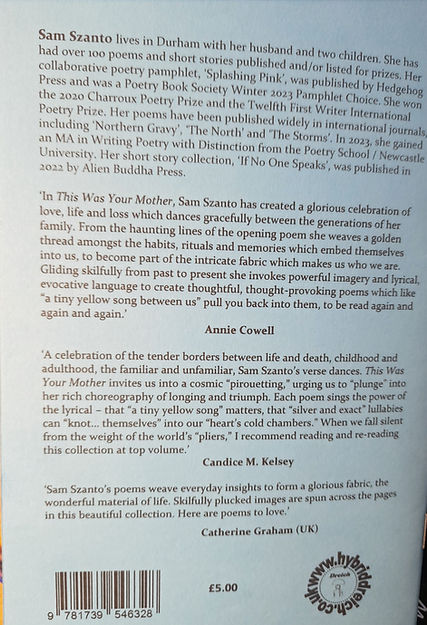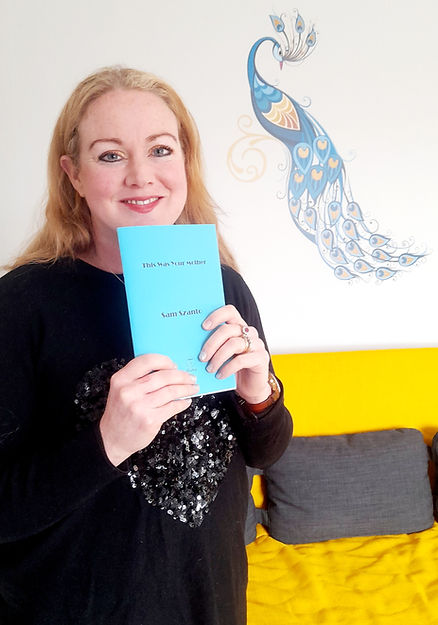20 Questions with... Nicole Rollender
- samszanto2
- Nov 13, 2022
- 7 min read

A 2017 NJ Council on the Arts poetry fellow, Nicole Rollender is the author of the poetry collection, Louder Than Everything You Love (Five Oaks Press), and four poetry chapbooks. She has won poetry prizes from Palette Poetry, Gigantic Sequins, CALYX Journal and Ruminate Magazine. Her work appears in Alaska Quarterly Review, Best New Poets, Ninth Letter, Puerto del Sol, Salt Hill Journal and West Branch, among many other journals. She's managing editor at THRUSH Poetry Journal. Nicole holds an MFA from the Pennsylvania State University. She’s also co-founder and CEO of Strand Writing Services. Visit her online: www.nicolemrollender.com.
Please introduce yourself. Where are you from? What was your life like growing up?
Hello, everyone! I’m Nicole Rollender and have lived in New Jersey (USA) my whole life.
Did you always want to be a writer? If you also work, what do you do / did you do?
Of course, it sounds cliché to say, “I’ve always known I wanted to be a writer.” But in my case, and I’m sure in many writers’ life experiences, that was the case. I wrote stories in pictures at age 3 and 4 – and have a conscious remembering that I felt like I was meant to craft and write and communicate.
Being a writer felt so innate to me, that I earned bachelor’s and master of fine arts degrees in literature and creative writing. My first “real” job, outside of working in a bakery and a shoe store, was in a local newspaper newsroom where I reported on local events and sports. I’d always hear the “you can’t make a living writing” line, but that didn’t deter me. Ultimately, after grad school I went into trade magazines, where I worked my way up the ladder until I became an editor-in-chief of two magazines for a decade.
Five years ago, my corporate position was eliminated – and I took the space to launch my own writing services business. I love being an entrepreneur and work with lots of corporate and solopreneur clients, and it never gets old. When I was an editor-in-chief, it was a more visionary, management and editing role. With my own business, I returned to doing what I love every day: writing.
Tell us about your most recently published work in a sentence.
My most recently published poem is Litany with Outpouring Light in trampset – this poem is the last poem in my forthcoming book, The Luster of Everything I’m Already Forgetting.
What are you working on right now?
Well, Kelsay Books recently accepted my second full-length poetry collection, The Luster of Everything I’m Already Forgetting, and it’ll come out in summer 2023. I started submitting this manuscript at the beginning of 2022, so it’s been sort of a focus on that, and getting individual poems published in journals. What’s next for me is getting the final manuscript ready for publication and thinking about my marketing plan to get the book into the right readers’ hands. It’s a different mode, but it’s exciting. I’m also working on other new poems, which slowly will start to arrange themselves into a third poetry collection.
Do you have a writing routine, and if so what is it?
The honest answer is… not really. When I’m leading up to write a poem, I’ve been hand writing words and phrases that resonate with me in my journal, for days or weeks before. Then, when I feel like the poem is “ready,” I set aside time to freely write. To get into poetry mind, I’ll often read poems from my favorite poets or whoever’s on my reading list at the moment. I will say that most of the time write poems on my computer using certain fonts like Garamond or Book Antiqua since I like seeing how they look and span out on the blank page.
Where do you write – always in the same space, or different places? Can you write ‘on the move’?
Since I work at home, I also write most of my poems at home, and then means moving from room to room, or outside with my laptop. In the summer I love to sit on the deck and watch the butterflies and hummingbirds flit among our hibiscus trees.
What advice do you have for other authors who are starting out? What is the best advice you’ve heard?
Good question! The best advice I’ve heard and can give is to believe in your work. If you don’t believe in it, no one else will. If you don’t believe in it, you won’t write it. If you don’t believe in it, it won’t be as strong. You need to believe in your work because it’ll get rejected a lot. Some writers will change their poems or their book when they get rejections. While taking feedback into account is important, it’s also key to know when feedback has merit and when rejection is purely subjective.
Do you enjoy doing live readings or are they a necessary evil – or somewhere in between?
I do enjoy doing live readings, although now I’d prefer doing readings over Zoom… since so much has gone online and there’s convenience in that. If I’m doing an in-person reading, I might be gone for five or six hours. With Zoom, obviously it’s as simple as going into my office for an hour.
Are there recurring themes in your work? Where do you feel these emanate from if so?
Of course! The Luster of Everything I'm Already Forgetting covers the complexities of motherhood, addiction, relationships, and surviving bodily trauma. Considering myself a Catholic poet, my influences are often spiritual in both the traditional sense and at a deeper level of introspection. Certain gifts, like second sight, discernment and divination pass from grandmother to mother to son, and I explore those gifts in a storyline that contains memory, our present and the afterlife. I work in a certain rhythm to create an experience both otherworldly and visceral, sublime and grotesque, haunting and haunted, as well as spiritual and embodied. So sometimes I feel like I’m writing the same poem over and over, in some ways,
Should writers have a moral purpose? What is the purpose of a writer in today’s society?
That’s a big question, and one that’s highly personal to every writer. What’s their calling? What are they writing? Who are they writing to and for? Why are they writing? If you’re an investigative journalist, you may be working a certain beat to expose large issues. For me, I write to share my experiences in an art form and hope that people may find something of their own life in my work, and feel less alone.
Do you write between genres or not?
I write creative nonfiction and essays on occasion for different purposes. I did a series of spiritual essays a few years back for Ruminate Magazine.
Which living writers do you most admire?
So many! A short short list of my current reading list includes Li-Young Lee, Louise Gluck, Anne Carson, Ross Gay, Traci Brimhall, Maggie Nelson, Alison Bemis White, Jane Hirshfield, Michelle Reale, there are truly so many…
Which dead writers do you most admire?
Again, so many, but I love… Rainer Maria Rilke, Franz Wright, Czeslaw Milosz, Pablo Neruda, Lucille Clifton, Jane Kenyon, Sylvia Plath, Max Ritvo, Emily Dickinson… and of course, Gerald Stern, who we just lost.
What’s the book you wish you’d written?
That always changes, but I feel like Rilke’s Love Poems to God was life-changing for me, and I go back to that one over and over and over.
What other external influences do you have: nature/place, music etc?
Music is huge for me and I’m usually listening to it when I work and write poetry. It’s also diverse: Gregorian chants, ‘50s doo-wop, funk, Elvis, Enya, Bon Jovi, ‘80s pop….whatever wakes up my writing flow, I’m there for it.
Do you suffer from ‘writer’s block’ and how do you overcome it if so?
Of course! Every writer I know does. The one who doesn’t must have something special in their soul. Part of writer’s block for me comes from imposter syndrome or worrying that I won’t be able to produce work that lives up to what I imagine it should be. Since I write for clients in my business every day, the simplest way to get past it is just to sit down and write something. If you start, you find your way into it eventually, even if the beginning is three pages in and you scrap all that. If you don’t start, you won’t make progress.
What’s been your favourite reaction to your writing?
At almost every live poetry reading I’ve ever done, someone has cried or come up to me later and told me they had a strong recognition or emotional reaction to my work. Not that I want to make people cry, but like all good art, I want people to respond to it. I want them to remember my poems. I want, even, for them to feel changed in some way after interacting with my work.
How do your family and friends feel about your writing?
Everyone’s very supportive of it, even if they don’t always understand what I’m doing. I have relatives and friends who tell me they don’t “get” poetry. My husband reads everything I write, and will tell me that it’s sometimes hard for him to read since he has such a visceral response to the work. It’s highly personal to him, since I write about our life, family, kids and so on. But as a non-poet, he knows my voice and my work caliber, as when it’s “great,” and will tell me pretty accurately when a poem is working and when it’s not.
Do you have a favourite bookshop?
Don’t kill me, but since 2020 it’s been Amazon. I love that I can read a poem I love online and then get the book instantly via Kindle or have pretty much any book shipped to me within a day or so. That being said, I love those out-of-the-way book shops where you can browse used books for hours or the library. I always head to the poetry section first to see who’s on the shelves, of course.
How do you see the future of writing? Will we become more or less dependent on Amazon?
It’s hard to say. Amazon POD kept my first poetry collection, Louder Than Everything You Love, available even after the press that first published it closed down. Presses are offering books via their sites and on Amazon, so it’s a useful marketplace for people to find books. In addition, for people who decide to self-publish for whatever reason, Amazon is a great way to do it. Lots of entrepreneurs or speakers want to get a business book out there, and POD is a wonderful way to do it on your own timeline.










Comments